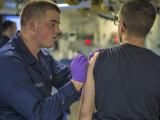Jan 24, 2003 (CIDRAP News) – As health officials in several states prepared to begin giving smallpox shots to healthcare workers, Secretary of Health and Human Services (HHS) Tommy Thompson today signed a declaration that triggers liability protection for those who administer the shots.
The declaration activates a provision in Section 304 of the Homeland Security Act, passed by Congress in November, that protects smallpox vaccinators from liability for adverse reactions to the vaccine. The declaration also invokes liability protection for healthcare workers who use vaccinia immune globulin (VIG) or the antiviral drug cidofivir to treat adverse reactions to smallpox vaccine.
In a news release, Thompson stated, "Today's action sends a clear message that the administration is committed to implementing its smallpox vaccination program that will ready medical response teams, which can protect the American people in the event of a smallpox attack."
The liability protection in the Homeland Security Act takes effect only if the HHS secretary officially declares that the potential for a bioterrorist attack warrants taking preventive measures. Under the terms of Section 304, today—60 days after signing of the Homeland Security Act—is the earliest that such a declaration could take effect, according to George E. Hardy Jr., MD, MPH, executive director of the Association of State and Territorial Health Officials.
The Centers for Disease Control and Prevention shipped 21,600 doses of smallpox vaccine this week to Connecticut, Nebraska, Vermont, and Los Angeles County. The Connecticut Department of Public Health announced it would begin giving smallpox shots to volunteers at the University of Connecticut Health Center in Farmington as early as today. Nebraska, Vermont, and Los Angeles County were not expected to begin giving the shots until next week at the soonest.
HHS officials said Thompson's declaration will be published Jan 28 in the Federal Register. In the document, a copy of which was obtained by CIDRAP News, Thompson states that "a potential bioterrorist incident makes it advisable to administer, on a voluntary basis, covered countermeasures specified in this declaration for prevention or treatment of smallpox or control or treatment of adverse events related to smallpox vaccination, to categories of individuals named in this declaration."
The declaration also states, "Liability protection for manufacturers and distributors of smallpox countermeasures and the hospitals, health care facilities, and health care workers who will receive them and treat potentially infected smallpox cases are integral to ensuring maximum participation in the vaccination program."
Section 304 provides that the federal government will defend against any vaccine-related liability lawsuits brought against vaccine manufacturers, institutions operating vaccination programs, and individuals authorized to give the shots. But the law says that if the government pays damages in such a case, it has the right to recover any portion of the damages that result from gross negligence or reckless or illegal actions by the original defendant.
The law does not provide a mechanism to compensate vaccinees who lose work time or have medical expenses because of reactions to the vaccine. Healthcare workers' unions have been urging HHS to provide for such compensation, and Thompson said earlier this week that he was working on a plan for a compensation fund.
See also:
Secretary Thompson's declaration
http://edocket.access.gpo.gov/2003/pdf/03-2012.pdf




















